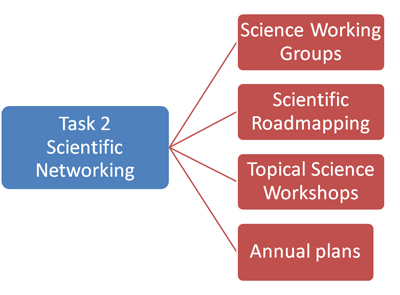Scientific Working Groups
(MPS, CNRS, UCL)
This task brought together the different science teams, especially new teams working on similar science topics and missions, to strengthen links and counter the fragmentation that still exists in the European planetary science community. It linked to other RI and H2020 activities. Meetings were made widely accessible by Webex tools. Meeting presentations are available on the projects web page; a summary report was prepared for the broad community. Special efforts were made to involve scientists from Inclusiveness States. Topical science workshops were organized, many of which will be based on the active ESA/NASA missions and in preparation of future missions. The themes of the meetings for each year were suggested by the Task Team for approval by the WPB. Some preliminary topics for such workshops were identified as follows:
Topical science workshops
- Organization of topical science workshops on the basis of currently active ESA/NASA missions and in preparation of future missions
- Presentation of workshop results at the annual EPSC meetings + possibly special issue publications in refereed journals (e.g. PSS, GI, ACP etc.)
Possible topics
- Active moons in the solar system(support of JUICE, Cassini, Europa Clipper); interior, surface, atmosphere, plasma environment of Europa, Io, Enceladus, ?)
- Comparative planetology in our solar system, templates for exoplanets
- Asteroids and Kuiperbeltobjects (support of DAWN, Hew Horizons)
- Eroding atmospheres
- Cometary science(Rosetta oriented). Focus on cometary activity?
- Mercury science (BepiColombo oriented). Review of the state of knowledge, including modelling
- Mars science (from Curiosity and MAVEN via Exomarsto Mars2020).
- Giant planets science. Galileo/Cassini/Juno/ links with Hinode(auroral physics at giant planets and related processes).
- Astrobiology, life in extreme environments (related to EXOMARS but also habitability with JUICE). Modelling this in laboratory.
- Future instruments and methods in planetology.
- Future mission concepts to Outer planets: Why do we need to (re)visit Uranus and Neptune.
- From planets to exoplanets, how diverse planets can be.... and how diverse are their interactionswith their star. Future observational capabilities.
- Preparing sample returns and their analysis(including meteorite analysis).
